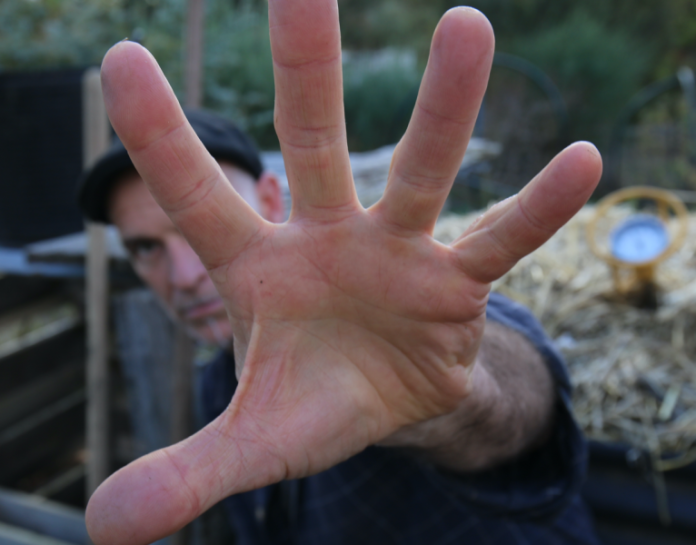Now in our fifth year, and with hundreds of compost piles under our belts, YIMBY has a wealth of compost knowledge to draw on. Yet we hear compost ‘facts’ repeated that we know just don’t stand up to scrutiny. Here are five compost ‘myths’ we’d prefer taken out of circulation.
Myth 1. We need at least a cubic metre of compost material to make a hot compost. YIMBY’s ‘continuous hot composting’ process allows us to build hot compost piles over four to seven weeks, breaking up the workload of gathering and building a cubic metre of compost from one hectic day to many weeks of more manageable work. Our ‘continuous’ piles get hot within a few days, and hold that heat, usually for a couple of months.
Dozens of local people (including all our YIMBY composters) are now benefiting from this approach.
Myth 2. Compost piles need to be in the sun to get hot. It is the heat generated by the teaming microbial activity in a minimum of 200 litres of material that makes a compost pile hot, not the sun.
Gedye-style bins can make great compost, but their smaller size makes it almost impossible to maintain hot composting conditions in them (55o C for 3 days minimum), sun or not.
Myth 3. Hot compost piles need weekly (or more regular) turning. Aeration in our compost piles is essential to good decomposition, but if we depend on regular physical turning to get oxygen into, and carbon dioxide out of, our pile, we are making way too much work for ourselves. Adding aerating material into the pile as we build it is the best (and easiest) way to ensure our compost can breathe.
At YIMBY we turn our hot composts twice. In cool composts, a healthy worm population will do the lion’s share of the turning work.
Myth 4. If our compost is not hot, add more nitrogen. We can do a pretty simple thought experiment to know this is a myth. Think of a bucket of kitchen scraps dumped weekly into a wet, heavy, stinky bin. This compost will not be hot, yet it is super high in nitrogen, and adding more nitrogen-rich material will just make things worse.
Occasionally it will be a lack of nitrogen that is stopping a compost from getting hot (think – a carbon-rich mulch pile), but as a blanket rule for heating up cool piles, it is going to be wrong more often than it’s right.
Myth 5. We can make finished compost in two weeks (or insert another unrealistic time frame). We can ‘cook’ food scraps etc. in a hot compost in two weeks and make them ‘safe’ to handle, but that is hardly making beautiful finished compost. Even with a hot and fast start, finishing compost well requires time for the fungi and worms to do their work. Five to six months to get finished compost is still fantastic, and well worth the wait.
Are there other compost stories you’d like scrutinised?
– Joel Meadows works with *Yes In My Back Yard, (YIMBY), a community-scale composting initiative in Castlemaine and surrounds. Send questions or comments to hello@yimbycompost.com, or to book in for a compost workshop.







